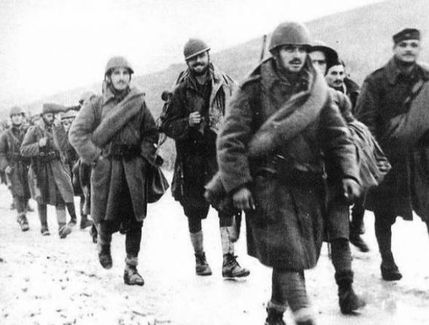 Greek soldiers on the Albanian front during the
Greek soldiers on the Albanian front during theGreek-Italian War of 1940-1941
The remains of 573 Greek soldiers who fell in the mountains of Albania during the 1940-1941 Greek-Italian War, at the start of WWII, will finally be laid to rest on Friday and receive a proper burial after 70 years, during a funeral ceremony to be held at a new Greek military cemetery in Kelcyra, Albania at noon.
Their burial meets a long-standing Greek demand for the exhumation, identification and burial of fallen Greek soldiers who fell in the fighting on Albania's mountains.
The Greek demands for the exhumation, identification and burial of fallen Greek soldiers was the result of two long rounds of gruelling negotiations initiated by Greece's Foreign Minister Nikos Kotzias with the Albanian government, as part of an effort to resolved outstanding issues between the two countries. The negotiations were held in November 2017 on Crete, Greece and the second in January 2018 in Korce, Albania.
The work of recovering and exhuming the soldiers' remains, which had started in Dragot, Albania in January, was completed and also puts to rest an issue that had long plagued Greek-Albanian relations. The 573 Greek fallen soldiers join another 100 Greek soldiers that have already received burial rites in July 13.
The search for the remains of more Greek soldiers that fell in the battlefields of Albania will continue, the foreign ministry said, in accordance with a decision reached by a joint expert committee responsible for implementing the agreement between Greece and Albania.
Under the agreement, Albania has agreed to build military cemeteries for the Greek soldiers that died on its soil and to seek, exhume, identify and bury their remains.
The Greek-Italian War resulted in Greece's unexpected and surprising victory over the well-equipped military of Mussolini's Italy thus making this the first Allied military victory of World War Two in continental Europe.
Source: AMNA
Their burial meets a long-standing Greek demand for the exhumation, identification and burial of fallen Greek soldiers who fell in the fighting on Albania's mountains.
The Greek demands for the exhumation, identification and burial of fallen Greek soldiers was the result of two long rounds of gruelling negotiations initiated by Greece's Foreign Minister Nikos Kotzias with the Albanian government, as part of an effort to resolved outstanding issues between the two countries. The negotiations were held in November 2017 on Crete, Greece and the second in January 2018 in Korce, Albania.
The work of recovering and exhuming the soldiers' remains, which had started in Dragot, Albania in January, was completed and also puts to rest an issue that had long plagued Greek-Albanian relations. The 573 Greek fallen soldiers join another 100 Greek soldiers that have already received burial rites in July 13.
The search for the remains of more Greek soldiers that fell in the battlefields of Albania will continue, the foreign ministry said, in accordance with a decision reached by a joint expert committee responsible for implementing the agreement between Greece and Albania.
Under the agreement, Albania has agreed to build military cemeteries for the Greek soldiers that died on its soil and to seek, exhume, identify and bury their remains.
The Greek-Italian War resulted in Greece's unexpected and surprising victory over the well-equipped military of Mussolini's Italy thus making this the first Allied military victory of World War Two in continental Europe.
Source: AMNA




 RSS Feed
RSS Feed